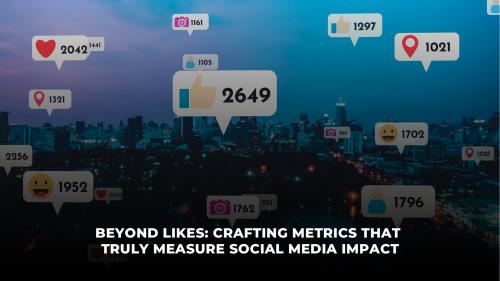Beyond Likes: Crafting Metrics That Truly Measure Social Media Impact

In the ever-evolving landscape of social media, likes, shares, and followers have often been hailed as the gold standard for measuring success. However, as digital ecosystems continue to transform and consumer behaviors undergo shifts, it's becoming evident that these traditional metrics merely skim the surface when it comes to evaluating the genuine impact of social media endeavors. In this blog post, tailored for a B2B tech publication audience, we will embark on a journey to explore the limitations of conventional metrics and delve into alternative measures that offer deeper insights into the true impact of social media strategies.
The Limitations of Likes
Likes, shares, and follower counts are undoubtedly important indicators of engagement and reach. They offer a quick snapshot of how well a post is performing and provide a sense of validation for content creators. However, relying solely on these vanity metrics can be misleading and fail to capture the full spectrum of social media impact. Here's why:
1. Surface-Level Engagement: Likes and shares only reflect surface-level engagement with content. They don't provide insights into the quality of interactions, the depth of engagement, or the impact on audience behavior beyond a simple click.
2. Incomplete Picture: Follower counts can be inflated by bots, inactive accounts, or follow-for-follow tactics, skewing perceptions of reach and influence. Similarly, likes and shares can be influenced by factors like timing, algorithm changes, and paid promotions, making them unreliable measures of genuine audience interest.
3. Lack of Context: Likes and shares lack context. They don't tell us why someone engaged with a piece of content, what actions they took as a result, or how it influenced their perceptions, attitudes, or behaviors over time.
Crafting Meaningful Metrics
To truly measure social media impact, we need to look beyond likes and focus on metrics that provide a more holistic understanding of audience engagement, brand perception, and business outcomes. Here are some alternative metrics to consider:
1. Engagement Rate: Instead of focusing solely on likes, track metrics like comments, shares, and saves to gauge the level of engagement with your content. Calculate engagement rate by dividing total engagements by total impressions and multiplying by 100 to get a percentage.
2. Reach and Impressions: Measure the reach and impressions of your content to understand how many unique users saw your posts and how often they were exposed to them. This provides valuable insights into the visibility and awareness generated by your social media efforts.
3. Conversion Metrics: Track conversion metrics such as clicks, website visits, sign-ups, purchases, or downloads to assess the effectiveness of your social media campaigns in driving desired actions and outcomes.
4. Sentiment Analysis: Use sentiment analysis tools to gauge audience sentiment and perception towards your brand, products, or campaigns. Analyze sentiment trends over time to identify areas for improvement and capitalize on positive sentiment.
5. Customer
Lifetime Value (CLV):
Measure the long-term value of customers acquired through social media channels
by tracking metrics such as repeat purchases, average order value, and customer
retention rates. This provides insights into the impact of social media on
customer acquisition and lifetime value.
Conclusion
In
today's digital landscape, measuring social media impact goes beyond likes and
surface-level engagement. It requires a nuanced understanding of audience
behavior, brand perception, and business outcomes. By crafting meaningful
metrics that align with your goals and objectives, you can gain deeper insights
into the true impact of your social media efforts and make data-driven
decisions to optimize performance and drive results. So, let's move beyond
likes and embrace metrics that truly matter in measuring social media impact.
Post Your Ad Here
Comments